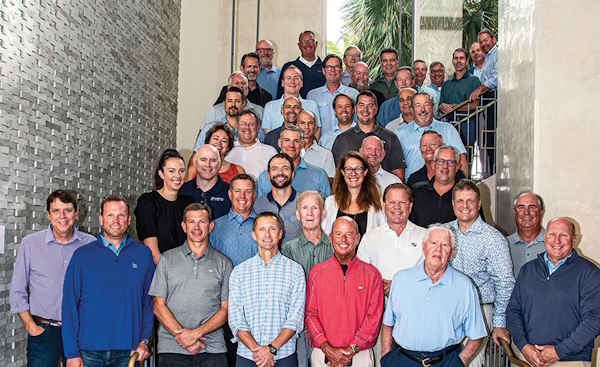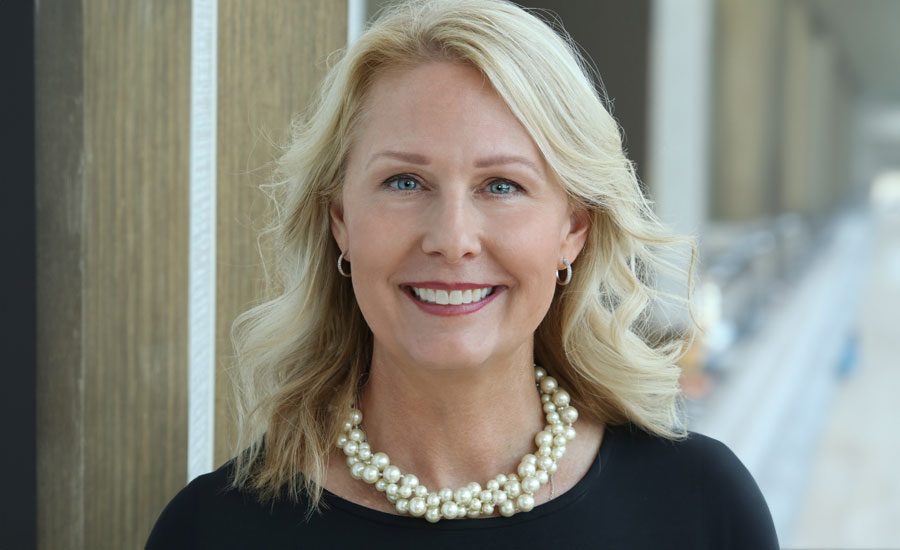When speaking with Terri Taylor about distribution and her role as a national residential division manager, it quickly becomes apparent she’s what you’d call "clutch" — the definition of a team player — leading from the front alongside her "people" versus sitting idly and watching her team execute.
“I've been putting together a tremendous team of motivated individuals,” she said. “I try to set the example. I go out, and I do the work, the same work that my guys are doing. I have no problem rolling up my sleeves and getting dirty.”
It’s a mindset Taylor learned from her parents, who ran an auto repair shop. Like most small business owners readily acknowledge, and what was taught to her through lived experience, Taylor intrinsically understands people had multiple roles and have to get their hands dirty, sometimes literally, to make sure things ran smoothly. She would bring these lessons into the distribution industry, which she joined in October 1998. Since then, Taylor has earned her way to a leadership position at 110-year-old MacArthur Co.
The Starting Line
Taylor spent nine years at a two-step distribution company, initially working in administration before becoming an inside sales manager. She built up experience running the sales division and working on regional commodity negotiations. Even in the glow of success — being responsible for $20 million in revenue — she said she never felt like "inside sales" was her true calling.
In November 2007, during the Great Recession, she joined MacArthur Co., helping open its Ramsey, Minn. location. Based on her prior experience, the company saw Taylor as a natural fit for a branch manager role, seamlessly switching from two-step to direct client interactions.
“When I was hired to run this market, we [did not have any] residential presence in the Minneapolis-St. Paul area, so there was nothing to feed off of,” she said. “In this market, I was hired to greenfield the entire thing. So it was definitely a learning experience, but I had all of the context from my previous experience.”
As the company grew, there was a need for someone to facilitate vendor relations and build the business's residential side; MacArthur Co. knew exactly who it wanted for the role — Taylor was promoted to national residential division manager and has held the position for seven years.
“I’ve been very fortunate that I’ve had a lot of mentors [who saw] potential in me,” she said. “I was hired to run what is now a very healthy national residential group of branches.”
Taylor manages two branches in Bloomington and Ramsey, Minn., in what is referred to regionally as the “Metro area,” and says she checks on both daily, optimizing processes and procedures with uniformity so the customer experience is indistinguishable, regardless of the branch a customer frequents.
“I have two of the most fantastic groups and teams of people at each branch. I honestly can't say enough about them, they're great,” she said. “They really pride themselves on doing a fantastic job, taking care of the customers, taking care of the company and … just being very genuine in how they approach things.”
At the national level, Taylor oversees negotiating programs and regional buys with vendors and gladly lends a hand to other regional managers when needed. She travels to nearly every location in her role and enjoys the camaraderie of the company’s employees.
“On a high level I work with all of the residential manufacturers in collaboration with our branches to grow business and make an impact," she said. “Being a 100% ESOP company brings a sense of ownership and a determination that you just don’t see in typical ‘clock punchers’ at most companies."
 Terri Taylor (fourth row from bottom, far left) attending the 2022 IDAC meeting in Boca Raton, Fla.
Terri Taylor (fourth row from bottom, far left) attending the 2022 IDAC meeting in Boca Raton, Fla.Racing Ahead of the Competition
With 50 locations nationwide, MacArthur Co. isn’t as far-reaching or as specialized as other suppliers. But Taylor believes that gives the supplier an advantage: Besides being employee-owned, giving each worker a genuine vested interest in succeeding, she said MacArthur leans into building long-term relationships.
“We all get our hands dirty and dig in and enjoy seeing things through to the end,” she said.
She acknowledges that a competitor is always looking to snag a piece of the pie on your plate, as in any competitive market; Taylor says cultivating client relations is how the best suppliers distinguish themselves.
“We don’t try to sell to everyone; we have a specific dynamic of customers that we gravitate towards,” she said. “It's our people that set us apart. We really pride ourselves on service and [having] a high moral compass, and the old-fashioned way of doing business; where your word means something. That seems to get lost in today’s fast-paced world. It's treating customers the way we want to be treated.”
Offering an example, Taylor said MacArthur can efficiently execute a quick turnaround on a will-call order that might take competitors extra time to fill; having parts and material on hand is part of being clutch, so MacArthur strives to have materials ready on demand so clients can finish the job.
“That's why we don't sell to everybody,” she said. “We see what happens to our competitors where people are waiting for hours, and to us, we do the math – if you’re not completing half a job a day over the course of a season, and we have a short season in Minnesota … that could cost you tens of thousands of dollars as a contractor.”
With MacArthur Co. dealing in multiple types of products outside roofing, Taylor says she has encountered all types of contractors and vendors and noted that of her clients, roofing contractor firms are those most frequently operating at the top of their game.
“It's heads above almost any other business channel out there; they know a lot about a lot because when they tear into those roofs, that house has a lot of important equipment and pieces and technology that they really have to be well versed in,” she said.
It’s no secret that men outnumber women in the construction industry, and distribution is no exception. However, Taylor said her experience working in the industry has been positive, and her male counterparts, both in distribution and contractors, have always shown her respect. That respect, she adds, has to be earned.
“You have to know your shit; you can’t BS these guys,” she says, laughing. “This is a real business; this is their livelihood, so if you don’t know what you’re doing, they’re going to figure it out quickly, and then you’re not going to last very long.
“The women in the industry are very knowledgeable — some of the most knowledgeable people I’ve ever met — so I think that goes a long way when you look at the small sliver of women in the industry.”
The other thing driving Taylor, aside from succeeding alongside her colleagues as a team? That would be drag racing. She loves it. She said her pleasure is heading to rural Crow Wing County, about 125 miles northwest of Minneapolis, to the Brainerd International Raceway, watching races where cars often hit 300 mph or faster.
“My dad was a drag racer growing up. My husband and my kids got hooked, and we are sure to attend them every summer … We all love it,” she says. “We go every summer.”









